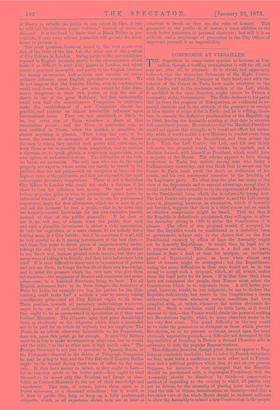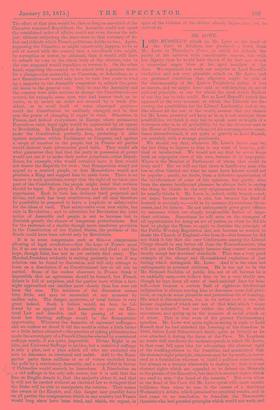COMPROMISE AT VERSAILLES.
THE disposition to compromise appears to increase at Ver- sailles, though a working arrangement is still far off, and may not, after all, be attained. It is stated, and apparently believed, that the stauncher Orleanists of the Right Centre, with the Due d'Audiffret Pasquier at their head, and with the consent of the Comte de Paris, have made overtures to the Left Centre and to the moderate section of the Left, which, if modified in the same direction, might ensure to France a reasonably stable Government. The Duke declares to his party that he fears the progress of Bonapartism, as evidenced in re- peated elections and in the attitude of the peasantry on receipt of false stories of coups d'e'tat in Paris ; and he is willing, there- fore, to concede the definitive proclamation of the Republic up to 1880, leaving the Assembly existing at that date to exercise full constituent power. He calculates that the Marshal-President would not oppose this strongly, as it would not affect his autho- rity, while it would enable a new Ministry to combat every form of propagandism except the Republican, and thus attract the Left. With the Left Centre, the Left, and his own thirty followers, the proposal could, he thinks, be carried, and a Ministry formed, with himself as President, which would have a majority in the House. The scheme appears to have strong supporters in Paris, but mainly among men who desire a Parliamentary monarchy, and who think that to secure one the Comte de Paris must await the death or abdication of his cousin, and his own consequent accession to the headship of the Legitimist party. To other eyes the plan has many of the vices of the Septennate and no especial advantage, except that it would enable France formally to try the experiment of a Republic in the Presidential form, which she is informally trying now. The Left Centre only promise to consider it, and the Left utterly reject it, proposing, however, an alternative, which if honestly put forward, suggests that there is a third course yet on which an effective compromise might be based. They say that if the Republic is definitively proclaimed, they will agree to allow the Assembly sitting in 1880 to revise the Constitution if it pleases. The effect of this proposal would, if accepted, be that the Republic would be constituted as a definitive form of government, subject only to the chance that on the first Presidential vacancy by efflux of time the Assembly might not be honestly Republican. It would then be legal for it to propose revision. This chance is a bad one to leave, because it fixes a kind of time for intrigue, an inevitable period of Equinoctial gales, an hour when almost any kind of treason might be attempted ; but the Republicans, seeing the many difficulties in their way, would not be in the wrong to accept such a proposal, which, at all events, makes them the legal party for six years. If in that time their ideas have not conquered the people, then France must select the Constitution which is to supersede them. A still better pro- posal, however, would, in our judgment, be one to declare the Republic definitively, but insert in the Constitution a clause authorising revision whenever certain conditions had been complied with, or rather, whenever the nation obviously de- sired it. Such a condition could do little harm, as it would amount to this,—that France would obtain the power of making her Revolutions legally, which to many observers seems to be her very first want. The grand difficulty in the way would be to make the guarantees as stringent as those which prevent Revolution, so as to prevent revisions, except upon the most obviously imperative grounds,—a difficulty not decreased by the impossibility of founding in France a Second Chamber able in extremity to defy the popular Representatives.
This difficulty, however, though great, does not appear to Eng- lishmen absolutely insoluble ; but to solve it, French statesmen, we fear, must learn a confidence in each other and in French- men and a political patience which they do not as yet possess. Suppose, for instance, it were arranged that the Republic should be proclaimed with a Septem3ial Presidency, that the Asssembly should be dissolved by thirds—a conservative method of appealing to the country to which all parties may yet be driven, by the necessity of placing some authority be- yond the risk of illness, assassination, or insanity—and that a two-third vote of the whole House should be declared sufficient to allow the Assembly to submit a new Constitution to the people. The effect of that plan would be, that so long as one-third of the Chamber remained Republican, the Assembly could not upset the established order of affairs, could not even discuss the sub- ject, without subjecting the innovators to that certainty of de- feat and ridicule which French politicians dislike to face. Again, supposing the Chamber, as might conceivably happen, to be so out of accord with the country that a two-thirds vote might, by corruption or terror, be obtained, then it would still have to submit its vote to the whole body of the electors, who in the case supposed would repudiate or reverse it. On the other hand, supposing the country to be seized with a genuine desire for a change—for monarchy, or Caasarism, or federalism, or a new Executive—it would only have to wait two years to send up a majority to the Assembly competent to submit the gene- ral desire to the general vote. Only in case the Assembly and the country were alike anxious to change the Constitution—to reward, for example, some man who had beaten back an in- vader, or to secure an order not secured by a weak Pre- sident, or to avail itself of some abnormal genius— could the Constitution be suddenly changed, and in that case the power of changing it ought to exist. Otherwise, in France, and indeed everywhere in Europe where permanent Executives exist, legal right would be superseded by an appeal to Revolution. In England or America, such a scheme would make the Constitution perfectly firm, protecting it alike against surprises within Parliament or Congress, and against a surge of emotion in the people, but in France all parties would distrust their adversaries' good faith. They would ask what guarantee they had that the party in possession of power would not use it to make their power perpetual,—that Repub- licans, for example, who would certainly have it first, would not decree the Republic for ever ; that Bonapartists would not appeal to a coerced people, or that Monarchists would not proclaim a King and support him by main force. There is no answer to such questions, except that the right of revision once part of the Constitution, the people might insist that revision should be legal. No party in France has hitherto tried the experiment. Each in turn has declared itself perpetual and divine, and each has been overthrown, and all may therefore by possibility be prepared to leave a loophole or safety-valve for the ideas of each. That safety-valve even now exists, but only in Revolution ; and to substitute for Revolution the joint action of Assembly and people is not to increase but to diminish greatly the chance of dangerous perturbations. But for the existence of a similar though more cumbrous provision in the Constitution of the United States, the problem of the South could have been solved only by Revolution.
It is in some compromise such as this—a compromise allowing of legal revolution—that the hope of France must lie, if no one system is to be made absolute and final ; and the hope, though faint, has not as yet entirely died away. The Marshal-President evidently is waiting patiently to see if any solution can be found by discussion, and will only attempt to force on a dissolution if no Constitutional law at all can be carried. Some of the coolest observers in France think it impossible that an agreement should be framed, but French debate is full of surprises, and the parties have within a fort- night approached one another more closely than has ever yet been the case. The noisiness of the discussion means very little, and may be succeeded at any moment by sudden calm. The danger, moreover, of total failure is very great indeed. Such a failure would, we fear, be fol- lowed by an appeal to the Assembly to pass an Elec- toral Law and dissolve, and the passing of an elec- toral law limiting suffrage would be the Bonapartists' opportunity. Whatever the demerits of universal suffrage— and we confess we dread it till the world is either a little better or a little better educated—the practice of taking plebiscites has made the sovereignty of a French Chamber elected by a restricted suffrage nearly, if not quite, impossible. Divine Right is an idea, and Universal Suffrage is an idea, but a restricted suffrage is only a plan, and a plan .which all who are excluded are sure to denounce as irrational and unfair. Add to the Bona- partist party three millions or so of voters excluded from the polls by a reactionary Assembly, and a coup d'etat in favour 'f Plebiscites would scarcely be hazardous. A Dissolution on
old suffrage is the only safe course, but it is said that the Due de Broglie dreads it, that the majority abhor it, and that it will not be carried without an electoral law so stringent that the Duke will be able to manipulate the returns. That means the return of the Empire, and this danger may possibly force on all parties the compromises which in any country but France would long since have been tried, and which, we repeat, in
spite of the violence of the debate already begun, may yet be II arrived al.







































 Previous page
Previous page